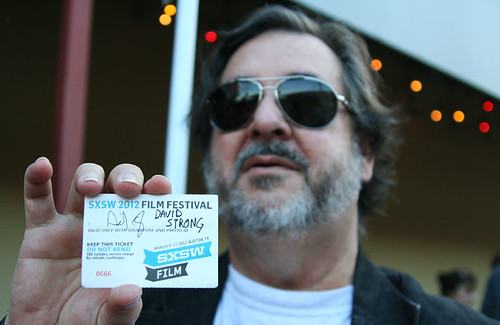Jette Kernion's blog
Review: Somebody Up There Likes Me
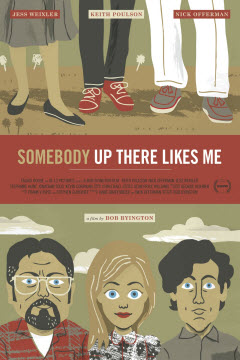 I've seen Somebody Up There Likes Me twice now -- once at SXSW 2012 with a lively local-heavy audience, once via screener with no one else but the cat -- and found the movie terribly funny both times. In fact, after I watched it the second time, I restarted the film so I could to see how the beginning tied into the end (it does, so pay attention) ... then had to stop myself from watching it a third time. The movie opens Friday at Violet Crown Cinema and I'm sorely tempted to go.
I've seen Somebody Up There Likes Me twice now -- once at SXSW 2012 with a lively local-heavy audience, once via screener with no one else but the cat -- and found the movie terribly funny both times. In fact, after I watched it the second time, I restarted the film so I could to see how the beginning tied into the end (it does, so pay attention) ... then had to stop myself from watching it a third time. The movie opens Friday at Violet Crown Cinema and I'm sorely tempted to go.
I liked it a lot, obviously. But I don't know whether you'd like it. Local filmmaker Bob Byington's universe is not for everyone.
Somebody Up There Likes Me is a comedy, but not in a broad sense -- its humor is very specific. I don't mean that it's full of obscure pop-culture references, either, because the movie could be set in any time or place. (You'd have to know Austin fairly well to recognize it was shot here.) The movie is off-center and your brain has to squint and tilt sideways and around the corner a little to appreciate it. Once you're in the universe of the film, however, it's wonderfully fulfilling.
At the heart of this movie is the relationship between Max (Keith Poulson) and Sal (Nick Offerman), although the focus is ostensibly on Max. Max and Sal work together in a fancy restaurant, along with Lyla (Jess Weixler), who catches Max's eye. Eventually Lyla and Max marry, and ...
You know, recounting this story does no good. It's not important what the characters are doing as much as how they're changing, or not changing, through the years. Because Somebody Up There Likes Me spans decades, although some characters never seem to look any older. Is this a reflection on how much they've matured inside? Possibly. The characters do a number of things externally that might be symbolic of their inner lives.
For example, during Max and Lyla's first date, their conversation is full of misses -- someone mishears, someone misspeaks. It's funny, it's a little awkward, and it's an apt representation of how relationships work (or don't). Lyla loves breadsticks ... and how does her enjoyment of them factor into the film? Lyla's father (Marshall Bell) appears to be an almost tangential character, but what is the extent of his influence on the events in the movie? Kevin Corrigan appears in a single scene, but his advice to Max might be critical. On my second viewing, I wondered fleetingly if Sal and Max were actually different aspects of a single character. And I haven't even mentioned the suitcase.
SXSW Review: Continental
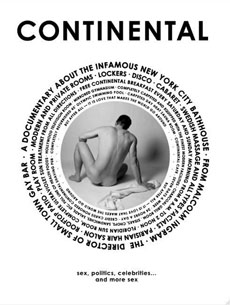 The documentary Continental faces a tough challenge: Very little film footage or still photos exist for the legendary NYC bathhouse in its heyday. It's understandable -- this was not a place where many people wanted their pictures taken. But it means Continental has to drum up visual interest in other ways.
The documentary Continental faces a tough challenge: Very little film footage or still photos exist for the legendary NYC bathhouse in its heyday. It's understandable -- this was not a place where many people wanted their pictures taken. But it means Continental has to drum up visual interest in other ways.
The movie takes us along on a breezy historical tour of the Continental Baths, one of the most well known and innovative bathhouses in New York in its prime. Steve Ostrow invested in the facility when it was a dark, dank warren of gay sex, and transformed it into a sophisticated gathering place and much cleaner, safer warren of gay sex. Eventually the Continental even drew a straight nightclub crowd for its concerts -- this is the place where Bette Midler launched her career.
Midler isn't one of the interview subjects -- she's represented only by still photos -- but many of the Continental's former employees and regulars happily recount tales of their time there. Interviews with Ostrow are the backbone of Continental, and in fact at times the story is not the history of the bathhouse as much as it is the history of the man who made it great, his work with the gay community, and his lifelong ambition to be an opera singer. He's such a magnetic interview subject that it's understandably why filmmaker Malcolm Ingram would focus on him.
To keep the documentary from being nothing but talking heads, Continental includes many contemporary shots of the hotel that used to be the home for the Continental, as well as the neighborhood surrounding it. It gets a little visually dull after awhile, but then I'm not sure what else Ingram could have done, unless he wanted to totally re-create the premises, a la Errol Morris? Which would have made for a very different movie. The rare footage and stills that do appear onscreen are fascinating -- I wish there were more.
SXSW Review: An Unreal Dream: The Michael Morton Story
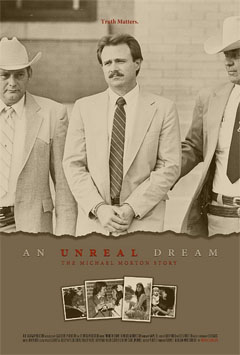 The timing for An Unreal Dream: The Michael Morton Story to premiere in Austin at SXSW could not have been more appropriate, if you know the news story it recounts. And how much you know about Michael Morton's life may dictate how much you enjoy this documentary from Houston writer/filmmaker Al Reinert (For All Mankind, Apollo 13). The film won the Documentary Spotlight audience award at SXSW earlier this month.
The timing for An Unreal Dream: The Michael Morton Story to premiere in Austin at SXSW could not have been more appropriate, if you know the news story it recounts. And how much you know about Michael Morton's life may dictate how much you enjoy this documentary from Houston writer/filmmaker Al Reinert (For All Mankind, Apollo 13). The film won the Documentary Spotlight audience award at SXSW earlier this month.
The short and incomplete version: Chris Morton, Michael's wife, was found beaten to death in their Williamson County home in 1988. Michael Morton was charged with the crime, found guilty, and sentenced to life in prison. But he continued to assert his innocence. If you've paid attention to Austin-area news in the last week, you know how this situation has played out.
An Unreal Dream is structured as though Michael Morton is casually telling the story of his life to us. He sits at the front of a courtroom and shares his perspective as though we're seated right across from him. His narrative is enhanced by archival news footage, still photos and interviews with people who know him, from his lawyers to his fellow inmates. When his son Eric Olson appears on camera, and he and Morton start to talk about how Morton's prison sentence affected his child, it's heartbreaking.
I didn't know Morton's whole history when I saw An Unreal Dream -- I knew about how he fit in the Chris Morton murder case, and how that's transpired recently, but the details were new to me -- how long he was in prison, etc. And that's why I'm not including those details here, in case you aren't acquainted with them either. I can't say how well the story would hold the attention of a viewer who had closely followed the story over the years.
No matter how much of the background you know, the interviews will still hold your interest. I particularly liked Morton's original defense attorney, Bill Allison. Morton himself recounts his story with extremely personal details. He details his relationship with God in a way that is touching without being cloying or proselytizing.
I felt the documentary lagged during the years Morton was in prison and nothing was going on regarding the case. As interesting as the interview subjects are, they can't carry the film without more forward motion of the plot, so to speak. Fortunately, this interval is fairly brief and the momentum picks up again.
SXSW Review: Computer Chess
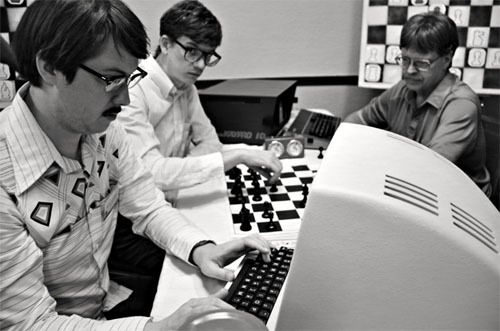
I work in high-tech so I'm no stranger to computer nerds, as they might have been called during the era in which the movie Computer Chess is set -- the 1980s, when computers were beginning to become portable. On the surface, this is a movie about "computers versus humans" in a chess tournament, but filmmaker Andrew Bujalski provides his actors with an environment for their characters to expand beyond nerdy stereotypes, giving the movie thoughtfulness and depth.
Computer Chess takes place at a weekend tournament where teams match their computers' best chess programs with one another, to see which is superior. The winning team will pit their computer against a human chess master. The programmers aren't the only people holding events in the hotel, however, and a weekend couples-encounter retreat provides some amusing contrast.
The film is shot and structured as though it were a documentary or found footage -- Bujalski even used a vintage video camera to shoot in black and white, to great effect. I wouldn't call it a "mockumentary" because it implies a level of screwball spoofery that isn't present. The "action" often pauses for characters to discuss whatever's on their mind, resulting in a slower pace than you might expect but also more fascinating characters and insights. The humor here is mostly subtle and sporadic, except for the couples-encounter scenes and a subplot about a character who can't find a place to sleep.
SXSW Review: Zero Charisma
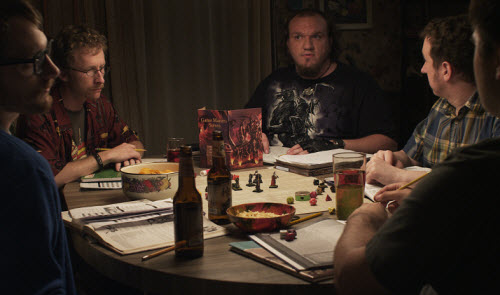
The Austin-shot movie Zero Charisma may be as close as we ever get to a cinematic adaptation of A Confederacy of Dunces. Scott Weidemeier, as portrayed by Sam Eidson, bears a strong resemblance to a contemporary Ignatius J. Reilly, if Ignatius were transplanted to a lesser city than New Orleans and had been introduced to role-playing games like Dungeons and Dragons. (Which leads me to ponder an Ignatius-approved RPG set in the time of Boethius, but I digress.)
What makes Zero Charisma so watchable is that Eidson and filmmakers Katie Graham and Andrew Matthews lead us to sympathize with a character as appalling and unlikeable as Ignatius would be, if we encountered him in real life. Scott is living with his grandmother in a glorious Fifties time capsule of a bungalow (with decor that would close Ignatius's valve), working as a delivery boy for the Donut Taco Palace, and in the rest of his spare time, creating and playing his own D&D-like role-playing game in which, naturally, he is the Game Master.
Scott's life is pretty routine until Fortuna spins her wheel and two horrible things happen: one of his regular RPG players drops out of the years-long game, and his grandmother suffers a stroke that brings Sam's mother (Cyndi Williams) and her husband back in town and invading Scott's sanctuary. He finds a new player, Miles (Garrett Graham), but Miles turns out to be a rival for the attention and perhaps allegiance of Scott's regular players.
Movies This Week: March 15-21, 2013
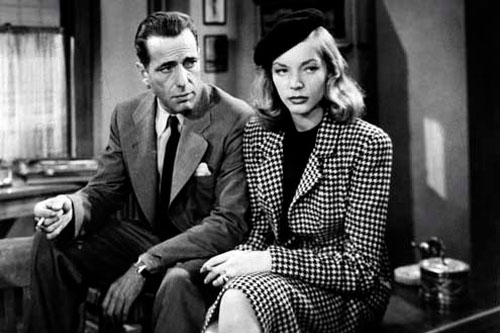
Oh, man. I'm so tired from SXSW that after Saturday, I won't want to watch a movie again for ... at least a day. Maybe three. However, if you're not feeling quite so burned out, there are lots of choices for moviegoing this week. In fact, if you're not sick of SXSW, there's still a full day of filmgoing on Saturday, and it would probably be quite easy to get a ticket for movies at the larger venues. Check out our reviews of movies screening tomorrow: The Retrieval, Rewind This! and The Bounceback. And although we don't have reviews for these films published yet, I'd recommend Continental, Debbie says All the Labor is great for Gourds fans, and Rod liked Drinking Buddies.
If you miss Rewind This! at SXSW, the "love letter to VHS" will have an encore screening on Sunday night at 10 pm at Alamo Drafthouse Ritz. Ritz is also showing Repo Man that night (and Monday), so you can really wallow in the 80s if you want.
On Monday, hopefully you will have recuperated enough to go back to the Ritz for some Sam Peckinpah, namely Bring Me the Head of Alfredo Garcia. If not, you can see it on Tuesday at Ritz or Slaughter, and on Thursday at Slaughter. Austin Film Society continues its Essential Cinema series on films from the Middle East on Tuesday night at 7 at Alamo Village with The Long Journey. Actor Alon Pdut will be in attendance.
SXSW 2013 Guides: One Film Guide to Include Them All
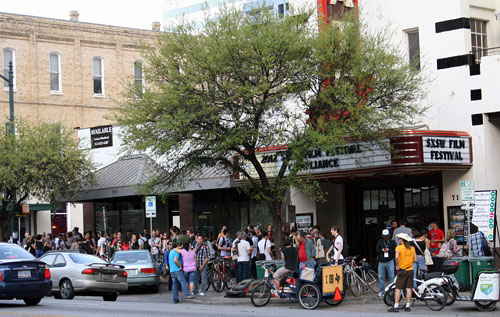
Here it is: The SXSW Film Fest Omnibus Survival Guide. Slackerwood has been publishing SXSW insider's guides for years, but this year I decided it was everyone else's turn. This guide is essentially a collection of all the guides and tips I could find that would help SXSW filmgoers. I also threw in our own guides from this year and when still relevant, previous years. It is truly One Guide to Rule Them All.
And if this isn't enough guidance, bring your questions to the SXSW Film Conference panel "A Beginner's Guide to SXSW Film" on Friday at 2 pm at ACC. Agnes Varnum, Yen Tan, David Modigliani, Kimberley Jones and I will attempt to answer them and if we can't, probably someone in the audience can.
Speaking of David Modigliani, let's kick things off with the "SXSW 2013: Do It Like a Local" video from Flow Nonfiction, where he's Creative Director. David's the guy on the left of local chef/restaurant owner Paul Qui. The advice is geared toward Music but there's a lot of universal tips in here (plus, it's fun).
SXSW 2013 Guides: Tips for Locals with Wristbands or Tickets
The SXSW Film Pass, a longtime favorite for Austinites wanting to see fest movies, is no more. Instead, the second-tier theater access pass is now the SXSW Film Festival Wristband, mirroring the music fest's access. I don't have a picture of the wristband yet, so enjoy the above photo of the now-obsolete pass that Austin frequent-filmgoer David Roland Strong is holding. Great pass number, you'll notice.
If you don't have one and want one, get them now before they run out (which they do) at Waterloo Records, Alamo Drafthouse Ritz, Alamo Drafthouse Slaughter and Alamo Drafthouse Village. You are actually buying a wristband voucher, which you then have to redeem for a physical wristband at a SXSW venue when the festival starts.
I'm faced with the problem of what to call people who are wearing the wristband, since I can't say "passholder" anymore. "Bandwearer"? "Wristband holder"? I favor "wristbandito" myself. I'll try some variations as we go along, you tell me which one you like.
SXSW 2013 Updates: Two Weeks and Counting
SXSW Film Festival and Conference kicks off two weeks from TODAY, on March 8. I can hardly believe it myself. Here are a few reminders and bits of news you might have missed ... plus one panel I'm sure you won't want to miss. If I missed something critical, don't hesitate to mention it in the comments.
- I'm happy to announce that once again, I'll be on the opening SXSW Film panel: "A Beginner's Guide to SXSW Film," moderated by Agnes Varnum. We have a lot of fun and also share valuable tips about having the best fest experience possible. Hope you'll join us on Friday, March 8 at 2 pm in Room 16AB of the Austin Convention Center. Other panelists include Kimberley Jones, the Screens editor at the Austin Chronicle; and filmmaker Yen Tan, whose feature Pit Stop is screening at SXSW.
- Of course you'll probably want to attend more panels and watch a few movies. You can now get the full SXSW Film schedule online. Apps are available for iPhone and Android. I'd love to hear your tips about how to plan and keep track of a screening schedule now that we no longer have B-side or Festival Genius (sniff).
Win Tickets to Texas Film Hall of Fame After-Party
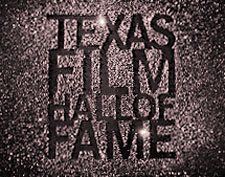 Austin Film Society has promised me that the after-party for the Texas Film Hall of Fame Awards this year is going to be a night to remember. The party starts at 9 pm on Thursday, March 7 in Austin Studio Stage 7 -- it actually overlaps a bit with the awards themselves, so you can get in there and start warming things up before the crowd from the awards ceremony fills the room.
Austin Film Society has promised me that the after-party for the Texas Film Hall of Fame Awards this year is going to be a night to remember. The party starts at 9 pm on Thursday, March 7 in Austin Studio Stage 7 -- it actually overlaps a bit with the awards themselves, so you can get in there and start warming things up before the crowd from the awards ceremony fills the room.
DJ el john Selector will provide some great music, with guest DJs Jim Eno (Spoon), Adrian Quesada (Grupo Fantasmo, Brownout) and Graham Reynolds (do I need to tell you Austin film people who he is?). There will be an open bar, and snacks from local businesses (Tiny Pies!). AFS is also promising us "lots of surprises," and when you consider that this after-party is for an event attended by many local and a few national celebrities, that could mean just about anything (in a good way).
I mean, I'm planning to go, and you know what a wuss I usually am about late-night parties, especially the night before a major local film festival for which I need to pace myself to survive.
Slackerwood is giving away two pairs of tickets to the after-party. I'll tell you how to get them after the jump. And if you don't win, you can buy tickets on the AFS website. The proceeds go to the Texas Filmmakers' Production Fund, and if you're a regular Slackerwood reader you don't need me to tell you how many great local movies have benefitted from this fund.


